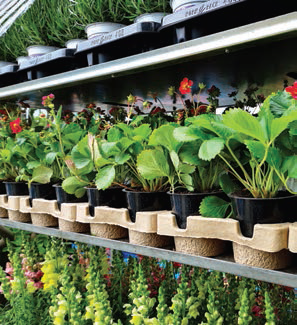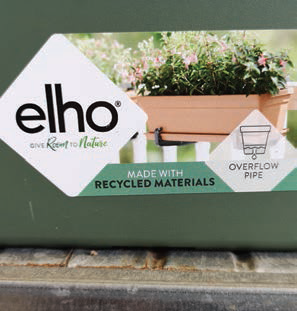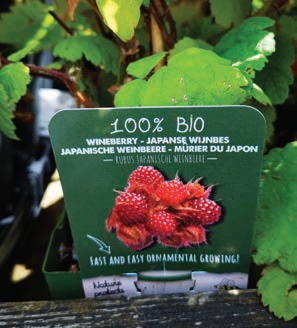Could the garden sector set the trend for greener retailing? Liam Kelly investigates
I was born back in the sixties, a time of protest and change on many issues be it racial, sectarian, political or military. It was an age of supposed total turmoil if any of the many recent decade-driven television series, or cantankerous musicians from that period are to be believed. From an environmental point of view, there were songs highlighting the need for that change, while others told farmers to put away their DDT, even if the majority of the paradise-paving public didn’t really want any spots on their apples, or care whether those farmers left them the birds and the bees.
Much of this music-based angst took a new direction and found new enemies to goad in the mid-seventies, waned in the recession-driven eighties before it was just about lost through the spend-all nineties and across to this side of the millennium. We did lose DDT and a few other chemicals in those intervening decades, but environmentalism remained relatively muted – both musically and generally – until the advent of the internet and social media, when those who needed an avenue for the outpouring of earth awareness found an information-hungry audience for their opinions without the need for twangy guitars or electric organ solos.
I could never be accused of being a card-carrying, sabre rattling environmentalist, but even my skeptical, cynical eyes can see that we need to start changing our habits. Even if we ignore or disprove the thoughts of some of the more eccentric denizens of social media we are still left with mounting evidence and indisputable facts that make any rationally minded person think that we are severely damaging the environment.
This shift is also impacting the shop floor, where retailers could be accused of environmental negligence what with their Sasquatch-sized-carbon-foot-printed products, plastic wrapping and their need to light up, cool down or heat stores in an often not-so-efficient manner.
Occasionally a supermarket or other retailer will come up with a green orientated venture or concept, but more often than not this comes across as a cynical plan to appease those who complain the loudest, even if it has the environment’s best wishes at its core. To me, the issue seems to be that these are all singular, standalone ideas that are unattached to a bigger, grander overall scheme of ‘best practice’ for eco-focused retailers. There is no universal consensus in this broad sector of what we are trying to achieve. This problem is compounded by the relentless pressure for retailers to keep pace with whims of constantly changing consumer demands and a host of other issues.
Unfortunately, the lack of cohesiveness and consensus in the general retail sector looks set to continue, but what about garden retailers? Surely it is the ideal seedbed for developing a plan that encompasses all of our sectors? I’m not privy to the machinations of any of the various retail groups, but as of now, I haven’t heard of any grand unifying scheme for garden centres and related retailers, let alone the wider horticulture community.

What is needed is a concerted statement of intent which encapsulates ideals, aims and objectives we can all buy into and which can be feasibly delivered over the coming years. We need to agree on targets for using sustainable energy, on reducing or recycling plastics, and for phasing out proven environment damaging products while encouraging the use of earth-friendly lines with a focus on good local sourced products. Framing an agreement and achieving buy-in will be a significant – if difficult – catalyst for change but if retailers take the lead, the manufacturers and suppliers will surely have to follow suit and those who do have a degree of proven environmental awareness should be favoured.

Such green centred thinking is already being implemented in the Netherlands, where they are ahead of the curve with their rationalisation and marketing of environmentally friendly products. One of the major plastic garden product suppliers in The Netherlands can boast of producing all their pots via the output from their own wind turbine and can state that its product contains 70% recycled materials (pic2). Dutch nurseries are also growing a range of plants that have been grown without the aid of artificial fertilisers or other chemicals (pic 3). Others produce ranges of organically grown fruit, (pic 1) bedding in biodegradable pots and some have recently started supplying recycled cardboard trays when shipping plants.

Of course, they have a scale of production and a Europe-wide list of potential customers, but at least they are seeing the problem, or are listening to consumer feedback and doing something about it. (Although there may be a tinge of irony considering they then ship those plants hundreds of kilometres in diesel guzzling not-so-green lorries, at least they are trying to force a change, and those plants would be shipped regardless). Can any local Irish nurseries follow suit?
On the garden care side of greener retailing, there is a growing range of earth friend fertilisers and pest controls available here from both European and Irish providers, which are gaining traction but, in my opinion, they are not being promoted enough by retailers or the suppliers themselves. Peat-free composts are readily available too from a number of suppliers, and its quality has also improved significantly, especially some Irish manufactured ones. I wonder have any retailers set a target for the percentage of these products they wish to sell?
These examples are just the tip of the iceberg, as there are many other areas that need discussion. Of real significance are product knowledge and data: How good or bad is a product for the environment? Carbon footprinting crudely captures some of this – although I doubt many retailers who import either directly or indirectly from, for example, China even do this exercise – but we have no idea of the other impacts in relation to pollution, packaging, deforestation and microplastics and so on; not to mention the humanitarian, ethical and moral implications. Taking a close look at the retail shop floor could be akin to viewing a Pandora’s box of our environmental ills but the enormity of the challenge ahead should not put us off. Evidence is increasing, solutions are emerging, public perception is shifting, and the opportunities are there for us to exploit. If we work together we can create a win-win scenario where the earth benefits, profits rise, and we can all feel better about what we are doing in garden retail.
Perhaps I am being naïve or looking too simplistically at the issues, but sometimes a simple idea is the start of something bigger and better for all of us…with or without cheesy musical anthems. ✽
 LIAM KELLY – Liam Kelly is one of the leading specialist consultants on the retail side of Irish horticulture. His in-depth knowledge, experience and no-nonsense approach are highly valued across many businesses in this sector, including garden centres, nurseries to hardware stores. He can be contacted at 086 8221494 or via lksolutions@eircom.net LIAM KELLY – Liam Kelly is one of the leading specialist consultants on the retail side of Irish horticulture. His in-depth knowledge, experience and no-nonsense approach are highly valued across many businesses in this sector, including garden centres, nurseries to hardware stores. He can be contacted at 086 8221494 or via lksolutions@eircom.net |






